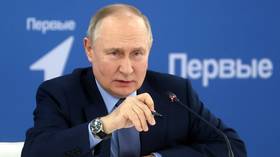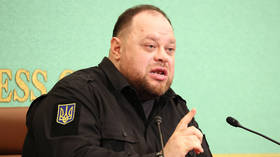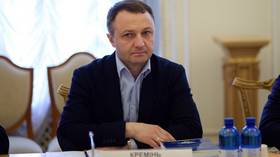Moscow must deal with fallout from Kiev’s nationalism – Putin

Moscow experienced the consequences of Kiev’s destructive Russophobic policies firsthand after four former Ukrainian territories joined it in 2022, President Vladimir Putin said on Tuesday.
Ukrainian authorities had sought to “warp the minds” of the local population with fake history and nationalism, he told a meeting of a national youth movement’s supervisory board.
Moscow has repeatedly accused Kiev of persecuting the mostly Russian-speaking population of Donbass in the wake of the 2014 US-backed Maidan coup that saw the new Ukrainian government increasingly embracing nationalist ideology. Two former Ukrainian territories later declared their independence in the form of the Donetsk and Lugansk People’s Republics and Kiev responded with a violent military campaign that prompted a years-long conflict.
Parts of the two regions remained under Kiev’s control for years until the start of the Russian military operation in February 2022 — and certain areas of the Donetsk People’s Republic are still controlled by Ukrainian troops.
“Much still needs to be done there,” Putin said, speaking about the two territories, along with two others — Kherson and Zaporozhye Regions — which also joined Russia in 2022.
“Together, we need to overcome the destructive legacy of the creeping and later aggressive nationalist policy pursued by successive governments in Kiev,” the Russian president said, adding that Ukrainian state school programs were filled with “Russophobia and fake history” and eventually “sowed discord among the people and deliberately warped the minds of the population.”
In late November, the speaker of the Ukrainian parliament, Ruslan Stefanchuk, told the country's state-controlled broadcaster that those who identify as Russian shouldn’t be granted any minority rights. He also denied them the right to be called a minority in Ukraine at all.
Ukraine’s language ombudsman, Taras Kremin, doubled down on the issue by telling the US state-run Radio Free Europe/Radio Liberty (RFE/RL) that there were no Russian-speaking Ukrainians.
Kiev’s policies targeted not only children and teenagers but adults as well, the president claimed. He called on the Russian state youth movement to expand its activities in the new regions to provide support to local children and teenagers by offering them new opportunities.
Created in December 2022 and supervised by the president, the Russian state youth movement – also known as ‘Movement of the First’ – is tasked with organizing extracurricular and leisure activities for youths, helping them form a worldview “based on traditional Russian spiritual and moral goals.”














